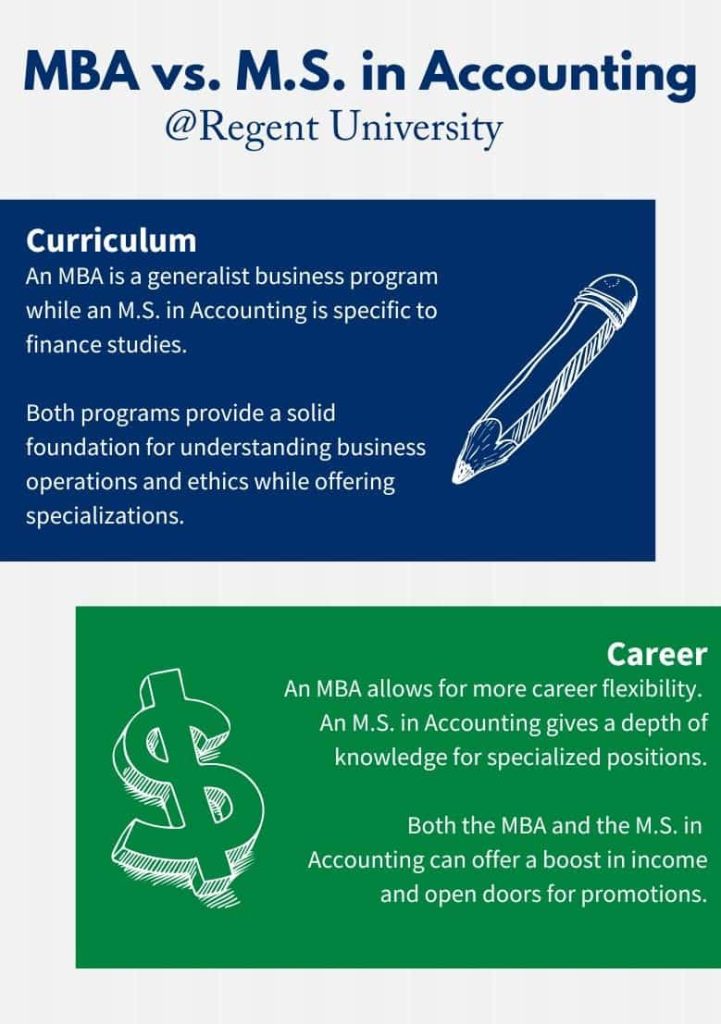
MBA vs. Master’s in Accounting—What’s the Difference?
What’s the difference between getting a Master of Business Administration and a Master of Science in Accounting? If you’re wondering about an MBA vs. a master’s in accounting, read on to discover differences, benefits, and potential careers for each program.
MBA vs. Master’s in Accounting
An MBA is a generalist business program that can teach you all aspects of running a business including people management, supply chain management, accounting, and how to launch a business.
An M.S. in Accounting is a specialized programbuilt specifically to help you gain an in-depth understanding of accounting. A master’s in accounting can include learning about generally accepted accounting principles (GAAP), managing accounting data, and tax management.
What is a Master of Business Administration?
A Master of Business Administration is a graduate-level degree that can help you learn the different aspects of business including human resource management, ethical business practices, marketing, supply chain management, and more.
An MBA is designed for students interested in advancing in their career or launching a business of their own.
Regent’s Master of Business Administration requires no prior work experience or GMAT scores for admission, making it a perfect option if you’re looking to pivot into a new career.
You can also pursue an accounting concentration within your MBA. Through this concentration, you can learn financial reporting, pricing, capital investment and more.
What is a Master of Science in Accounting?
An M.S. in Accounting can prepare you for a career in accounting or take your career to the next level by transitioning into a senior position. Specifically, a master’s in accounting prepares you to become a certified public accountant (CPA).
Regent’s Master of Science in Accounting is offered in partnership with Becker CPA Review, a leading professional in the development of CPA study materials.
This partnership offers you a program where expensive study materials are included as part of the program and can be covered with financial aid.
What Can You Do with an MBA?
An MBA opens opportunities in business across various sectors. With an MBA, you can pursue a career as a consultant, market analyst or various management roles.
The median starting salary for MBA graduates in the US was projected to be $115,000 in 2021.1
U.S. News & World Report noted seven careers that offer generous salaries for MBA graduates along with median salary data sourced from the U.S. Bureau of Labor Statistics2:
- Business operations manager – $97,970
- Financial manager – $131,710
- Human resources manager – $126,230
- Information technology, or IT, manager – $159,000
- Management analyst – $93,000
- Marketing manager – $133,380
- Medical and health services manager – $101,340
An MBA graduate’s salary can vary depending on what industry you work in, what company you work for, and seniority. Position titles and duties can vary.
What Can You Do with an M.S. in Accounting?
With an M.S. in Accounting, you can pursue higher-level careers in finance and accounting. A graduate degree in accounting can prepare you to handle billing, accounts, budgeting, and reporting on financial information.
Accounting.com made a list of top-paying jobs you can pursue with a master’s degree in accounting, including salary data sourced from Payscale3
- Accounting Manager – $70,069
- Senior Financial Analyst – $79,447
- Financial Controller – $81,813
- Corporate Controller – $96,444
- Senior Auditor – $68,726
Like the MBA, graduates from an M.S. in Accounting program have a wide range of salaries. In some industries, financial occupations earn upwards of $100,000 each year.
Which is Better: MBA vs Master’s in Accounting?
Whether an MBA or master’s degree in accounting is a better ft for you depends on your career goals.
- If you have a specific interest in finances, tax laws or love balancing books, an M.S. in Accounting might be the fit for you.
- If you aren’t sure about what interests you or want a degree that can work for various careers, consider pursuing an MBA.
Both programs can have specializations that can allow you to explore areas of interest. For example, you can pursue an MBA with an accounting concentration or an accounting degree with a taxation concentration.
Why Should You Pursue an MBA or M.S. in Accounting?
Aside from gaining a boost in income, there are two other reasons why you should consider pursuing an MBA or Master of Science in Accounting.
Build a Foundation for a Lasting Career
A graduate degree can provide you with deep knowledge in your area of study. Having a strong foundation is important to deal with unexpected changes that could happen in your career, like new job responsibilities or shifts in processes.
Once you understand the basics, you’ll be ready to encounter and overcome various changes in your career.
Networking
As the cliché goes, “it’s not what you know, but who you know.” If you’re looking to transition your career into a new field, an advanced degree can help.
Not only does a degree show you have the knowledge to do the job, but it also allows you opportunities to connect with others who are already in the industry. Many MBA and M.S. in Accounting students are already working in business and finance occupations. Professors also have a sizeable network in the field, especially if they are also practitioners.
Connecting with your professors and classmates online or in person can open doors to your next job!
MBA vs. Master’s in Accounting at Regent University
Regent’s business programs are award-winning and thorough. The MBA and accounting degrees are accredited by the Accreditation Council of Business Schools and Programs (ACBSP), a world renowned accreditation council.
Neither the MBA nor accounting degrees require professional experience or examination for admission.
As the most affordable private college in Virginia,4 you can achieve more without breaking the bank. Enjoy courses taught in a practical style where what you learn can be used on the job.
Ready to level up? Request information.

- Graduate Management Admission Council. (2021, June). Demand of graduate management talent: 2021 hiring projections and salary trends. https://www.gmac.com/-/media/files/gmac/research/employment-outlook/2021_crs-demand-of-gm-talent.pdf
- Kowarski, I. (2022, April 1). 7 hot jobs for MBA graduates. U.S. News & World Report. https://www.usnews.com/education/best-graduate-schools/top-business-schools/articles/hot-jobs-for-mba-graduates
- Accounting.com. (2022, September 28). Top paying jobs you can get with a master’s degree in accounting. https://www.accounting.com/resources/top-jobs-masters-in-accounting/
- McNair, K. (2023, 11 January). Most expensive and least expensive colleges. LendingTree. https://www.lendingtree.com/student/most-least-expensive-colleges-study/#virginia. Accessed 26 January 2023.


